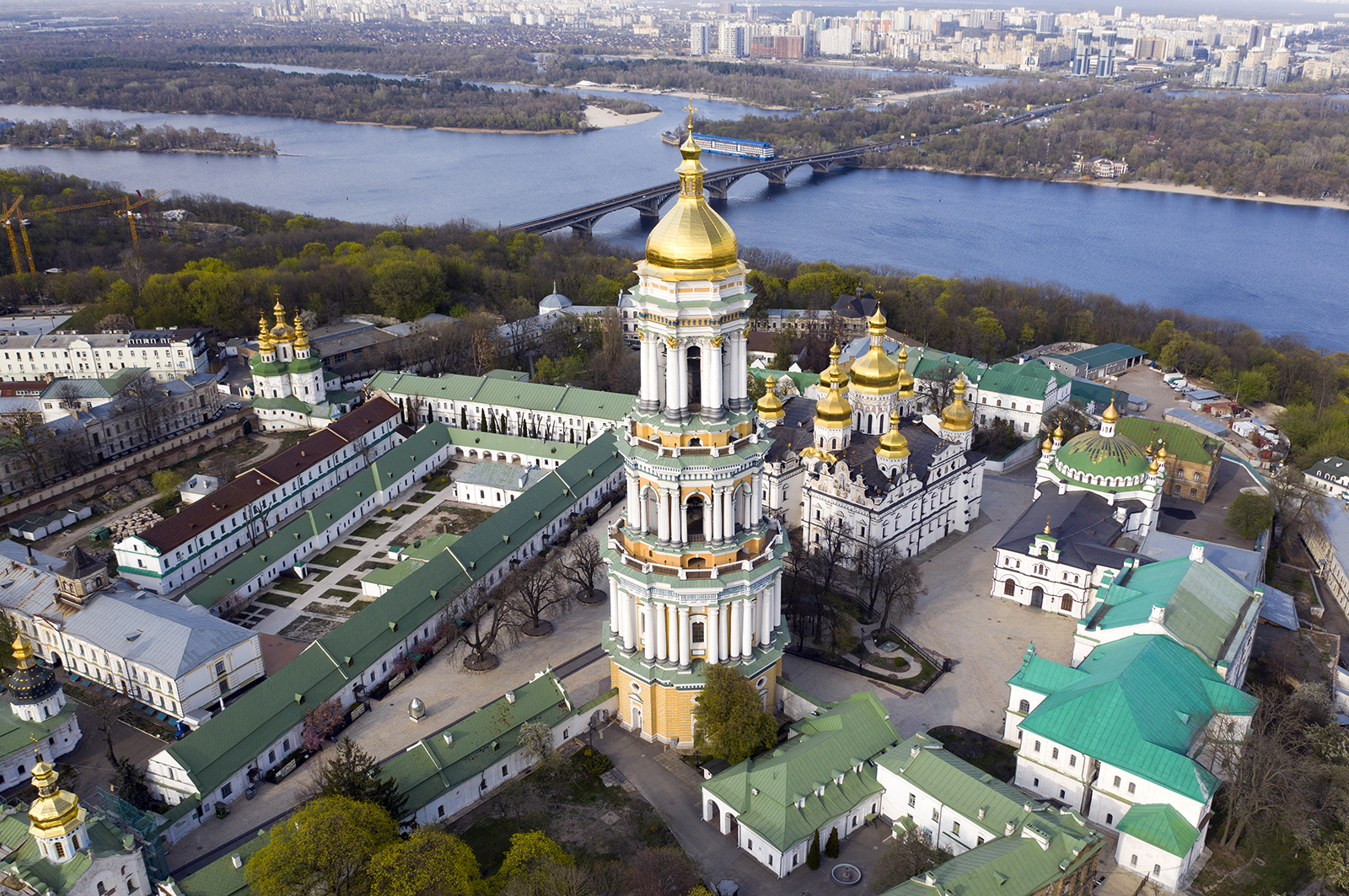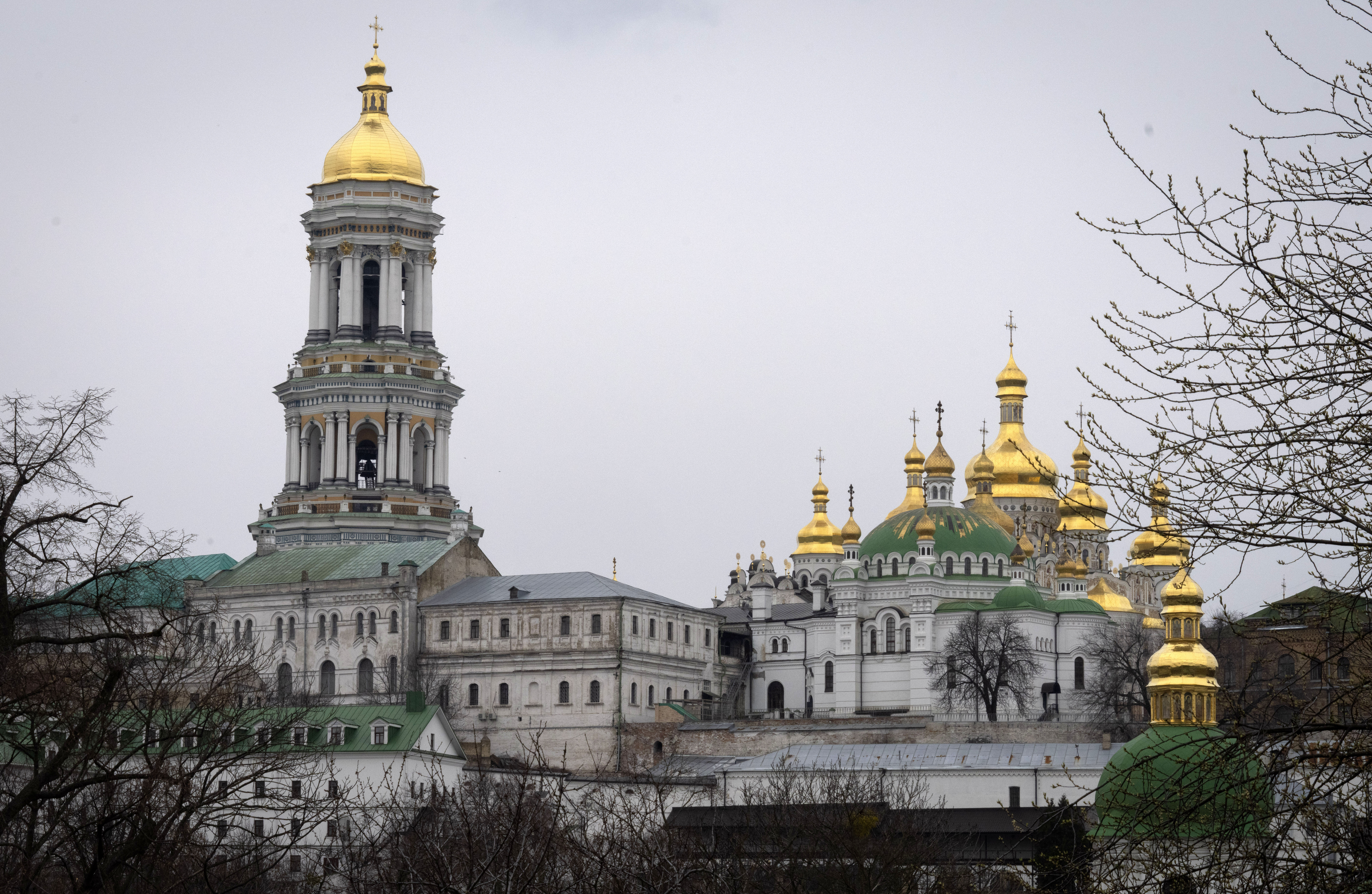(RNS) — Crowds of visitors have packed the dozens of services at Kyiv’s Monastery of the Caves in recent days to receive sacraments, pray and kiss holy relics of saints in the catacombs —fearing each visit will be their last chance to worship with monks before either the Ukrainian government or a rival church takes over one of the most sacred sites in Eastern Orthodoxy.
The monastery’s fate has been in question since Russia’s invasion in February 2022 has brought a series of crackdowns on the Ukrainian Orthodox Church, which has historical ties to Moscow.
The Ukrainian Culture Ministry has pledged to evict the 700 UOC monks, students and staff living on the monastery’s grounds by Wednesday (March 29).
“We don’t know what to expect but we are ready for everything,” said Nikodim Kalonger, a deacon and seminary graduate who has lived at the monastery for 12 years and plans to become a monk in the UOC. He said there is a “kind of joy over the Lavra because people from all over Ukraine are gathering each day filling our churches and our caves.”
“We are going to stay here until the very end. … The only weapon we have is our prayer.”
The monastery, founded in 1051 and called the Pechersk Lavra, holds special significance for Ukrainian and Russian Orthodox Christians, who trace their Slavic Christian roots to a mass baptism in 10th-century Kyiv. Today the complex includes historic churches, relics and icons, catacombs, a state museum filled with medieval chronicles and other artifacts, as well as the UOC’s main theological academy with its own museum and residential buildings.
The UOC has for centuries maintained allegiance to the Russian Orthodox Church, and despite its condemnation of the Russian invasion and its declaration of full independence from Moscow in May 2022, has remained suspect. The March 10 announcement that Lavra’s monks would be evicted is just the latest anti-UOC measure taken by the Ukrainian government.
Since October, the Security Service of Ukraine has launched raids and searches at UOC churches, including the Pechersk Lavra, imposed sanctions on UOC bishops and supporters and lodged criminal cases against dozens of clergymen. The Ukrainian Parliament has been considering a draft law that could effectively ban the UOC.

An aerial view of the Monastery of the Caves, also known as Kyiv-Pechersk Lavra, one of the holiest sites of Eastern Orthodox Christians, in Kyiv, Ukraine, April 13, 2020. (AP Photo/Efrem Lukatsky)
Ukraine has also swapped several “collaborator” UOC clergy for its soldiers captured by Russia.
“Of course sometimes our parishes, our priests have their own opinion and start trouble,” Kalonger said, emphasizing that the church stopped commemorating Patriarch Kirill of Moscow at services soon after last year’s invasion and that many parishioners and priests alike are defending the country in the Ukrainian armed forces.
“Of course, there are rumors,” the deacon said, of UOC priests being spies for Russia, “but if you have evidence, please do according to our laws. You know, spies, they could be anywhere.”
A rival church, the self-governing Orthodox Church of Ukraine, is expected to gain control over the monastery if the eviction is carried out. The OCU was formally recognized by the Ecumenical Patriarch of Constantinople in 2019, prompting Russian President Vladimir Putin to threaten bloodshed. At Christmas, the government allowed the OCU, associated with the Ukrainian resistance, to celebrate a service at the monastery for the first time since Ukraine’s independence in 1991. Its leader, Patriarch Epifaniy, has repeatedly called for the Lavra’s monks to join his ranks, but few have followed him because they have concerns the OCU is not canonical and does not always follow proper procedures to ordain priests, Kalonger said.
Each of the churches vying for control claims to be the largest Orthodox body in Ukraine. The older UOC has about 12,000 parishes, compared with the OCU’s 7,000, according to the statistics from 2021, but since the war started an unknown number of parishes have transferred or split. About 36% of Ukrainians call themselves “simply Orthodox” to avoid identifying with either church, while 40% belong to the OCU and 22% affiliate with the UOC, according to a January 2022 survey by the polling firm Razumkov Centre.
The Ukrainian government, which owns the Pechersk Lavra site, is terminating a lease that allowed free use of the property, alleging the monks violated terms by constructing new buildings. Archbishop Sylvester (Stoychev) of Bilohorodka, dean of the 400-year-old Kyiv Theological Academy and Seminary, said in a March 27 statement that the academy renovated buildings given by the Soviet government in 1989 at the academy’s own expense. The academy, he claimed, received no documents indicating violations and would have worked to resolve any issues.
Losing the buildings would mean a temporary end to housing and education for the approximately 300 students, according to Sylvester, and greatly hinder the church’s ability to train and produce clergy.
“An educational institution with ancient and glorious traditions may perish before our eyes,” Sylvester said.
After the Russian invasion, the academy provided food and medicines to the Ukrainian armed forces and people in need, and several graduates and relatives of students are defending Ukraine in the army, he added.
Archimandrite Filaret Voloshyn, vice rector of the academy, recorded a video message Thursday appealing to religious leaders of every faith.
“Without the certainty that their relatives, children and brothers can continue in the seminary and pray for them, thousands of our Ukrainian soldiers … can become demoralized,” he said, adding that serving God from Lavra will help “make peace in a free and democratic Ukraine where everyone can pray to God as he or she wants, following our Western values which respect human rights, especially religious rights.”





